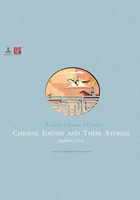
画龙点睛 (huà lóng diǎn jīng)
Eyes of the Dragon
The literal translation of the Chinese idiom Hua Long Dian Jing is “to dot the eyeballs in painting a dragon.” The saying is now widely quoted to refer to adding the crucial touch to a work of art that brings it to life, or putting in a word or two to clinch the point.

The expression is based on a legend about a famous painter, Zhang Sengyao.
Zhang was once an officer serving in the court of Emperor Liang Wu (464-549 AD). But he was best known for his outstanding artwork.
It was said that whenever the emperor missed his sons who were away on official duties, he would ask Zhang to visit him and paint portraits of them. The pictures were so vivid that when the ruler saw them, he felt he were actually seeing the boys in person.
There also was a story about Zhang painting an eagle on the wall of a big temple in what is now Zhenjiang city in eastern China’s Jiangsu Province. Legend has it that the life-like eagle scared all the small birds away from the temple, leaving behind their empty nests there.
One day, Zhang was painting four dragons on the wall of the Anle Temple in Jinling (now Nanjing, the capital of Jiangsu Province). The scene drew a large crowd.
In less than half a day, the artist had finished the painting. The onlookers all loudly praised the fine work, but they were puzzled to find that none of the four dragons had eyeballs.
“Why don’t you add eyeballs to the dragons?” asked one onlooker.
The artist answered: “If I do, they might fly away into the sky.”
Few were convinced by that explanation, and some of them challenged the artist to prove just how a dragon in a painting could fly.
To convince the crowd, the artist went ahead and added eyeballs to two dragons on the wall and instantly, a thunderstorm began and the two dragons took off from the wall and soared off into the dark cloudy sky.
When the storm abated and the crowd recovered from their awe, they found only two dragons left on the wall and they were the ones with no eyeballs.